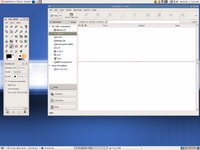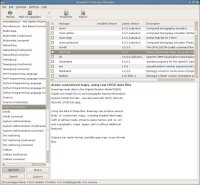 Microsoft Windows is unquestionably the most popular desktop operating system in the world. With so many people using Windows, finding help usually isn't to difficult. Unfortunately there are a lot of security problems with Windows. There are many reasons for this that I won't get into here. Windows is also expensive. Windows XP Professional Edition, the full version with Service Pack 2, is currently selling on Staples.ca for $399.85CDN, much more than The Working Centre sells refurbished computers for. Given the cost of Windows XP it's easy to see why computer recyclers don't sell refurbished computers with Windows XP. And Microsoft Windows XP Professional doesn't even include Microsoft's famous Office suite. The full version of Microsoft Office 2003 Professional currently retails on Staples for $649.99CDN. There are light versions of Windows XP, known as Home, and Office, known as the standard edition, but these are missing features other operating systems and suites include. At over $1000 for just these two pieces of software it's easy to see why people are looking for alternatives... And one of those alternatives is an operating system I know and love called Linux.
Microsoft Windows is unquestionably the most popular desktop operating system in the world. With so many people using Windows, finding help usually isn't to difficult. Unfortunately there are a lot of security problems with Windows. There are many reasons for this that I won't get into here. Windows is also expensive. Windows XP Professional Edition, the full version with Service Pack 2, is currently selling on Staples.ca for $399.85CDN, much more than The Working Centre sells refurbished computers for. Given the cost of Windows XP it's easy to see why computer recyclers don't sell refurbished computers with Windows XP. And Microsoft Windows XP Professional doesn't even include Microsoft's famous Office suite. The full version of Microsoft Office 2003 Professional currently retails on Staples for $649.99CDN. There are light versions of Windows XP, known as Home, and Office, known as the standard edition, but these are missing features other operating systems and suites include. At over $1000 for just these two pieces of software it's easy to see why people are looking for alternatives... And one of those alternatives is an operating system I know and love called Linux.Linux comes in many shapes and forms. At The Working Centre we use two flavours (called "distributions") of Linux. One of those flavours we developed just for The Working Centre, The Working Centre Linux Project (WCLP). We designed WCLP back when we refurbished 486s. The idea was to provide a simple free desktop operating system with lots of software. While there is Commercial software that you can buy for Linux, it's difficult to find in stores, and the majority of Linux software is free - you just have to know how to get it. The other flavour of Linux we install on our Working Centre machines is Ubuntu Linux, a very user-friendly flavour that comes from South Africa.
Now you may have heard that Linux software doesn't match up to Windows software. In some cases this is true, but often it's really the other way around. Most flavours of Linux include more software than Windows comes with, and the software often covers a much wider range of interests. Standard software, such as instant messaging software (gaim), web browsers, and office software (not Microsoft Office, but good office software) is included with most Linux distributions.
As I hinted, there is also a lot of other great unusual software. Electronics buffs will appreciate the fact that there is free software to design circuit boards. If you're into geography and geology there's a slew of free software to help you map aspects of the earth. And podcasters will love Audacity, a wonderful program for editing sound files. These are just a few of the thousands, yes I said thousands, of free cool programs available for Linux.
 Ubuntu Linux comes with a program called Synaptic which makes installing software over the Internet as simple as right clicking and marking the programs you want to install - no scary text interface; though you could use one if you want, and sometimes doing things the old text-way is faster than moving the mouse and clicking on icons.
Ubuntu Linux comes with a program called Synaptic which makes installing software over the Internet as simple as right clicking and marking the programs you want to install - no scary text interface; though you could use one if you want, and sometimes doing things the old text-way is faster than moving the mouse and clicking on icons.Perhaps the biggest benefit of Linux is that it doesn't suffer from Spyware problems. With the exploding commercialization of the Internet there are a lot of unsavoury types looking to make a quick and dirty buck. One of the ways shady organizations take advantage of people is by installing spyware on your system when you visit their web site, or click on their pop-up ads. Sometimes these ads are cleverly disguised as "helpful hints" telling you your computer is infected, when in fact it really isn't. There are ways of combatting spyware under Windows, which I mentioned in my last post, but one of the best ways is simply not to use Windows. Some people have suggested that Linux doesn't suffer spyware problems because it doesn't have the same amount of users - this statement is a myth proliferated by people who don't really know how Linux works. The real reason Linux is less prone to spyware problems has to do with the fact that it's built with a few more restrictions on regular users. It's possible to mimic similar security under Windows, but it isn't the default on most Windows installations.
Now I'm not saying that Windows is bad, or evil. Windows is an easy to use operating system, and it can be very secure if you know what you're doing, and take secure measures. We use Windows on the majority of our staff and public computers here at The Working Centre. But when I go home at night, the operating system I use on all my computers at home is Linux. Linux has a lot more software available for free. I don't have to 'activate' my version of Linux, and best of all, I can download Ubuntu Linux (and many other distributions) and give it away to anyone to use.
1 comment:
I like what you have done with Computer recycling since I have left. Maybe I could do something to help.
Thank You
Post a Comment